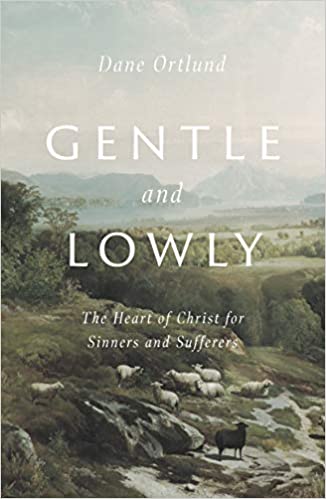When I first saw Dane Ortlund’s book, Gentle and Lowly, I thought the subject would be encouraging Christians to be humble and kind in their dealings.
But then I learned that the book explores the gently and lowly aspect of Jesus. Jesus described himself this way, but often when people emphasize His gentleness, they deemphasize His holiness, His righteousness, His anger at sin, etc. I wasn’t familiar with Dane Ortlund, so I wasn’t sure how he would handle this topic. I began the book warily.
I need not have worried. Ortlund takes great care to keep in mind the whole picture of who Jesus is.
Yes, he is the fulfillment of the Old Testament hopes and longings (Matt. 5: 17). Yes, he is one whose holiness causes even his friends to fall down in fear, aware of their sinfulness (Luke 5: 8). Yes, he is a mighty teacher, one whose authority outstripped even that of the religious PhDs of the day (Mark 1: 22). To diminish any of these is to step outside of vital historic orthodoxy. But the dominant note left ringing in our ears after reading the Gospels, the most vivid and arresting element of the portrait, is the way the Holy Son of God moves toward, touches, heals, embraces, and forgives those who least deserve it yet truly desire it (p. 27. All page numbers are from the Kindle version).
As we zero in on the affectionate heart of Christ, how do we ensure that we are growing in a healthy understanding of the whole counsel of God and a comprehensive and therefore proportionate vision of who Christ is? Three comments are needed here. First, the wrath of Christ and the mercy of Christ are not at odds with one another, like a see-saw, one diminishing to the degree that the other is held up. Rather, the two rise and fall together. The more robust one’s felt understanding of the just wrath of Christ against all that is evil both around us and within us, the more robust our felt understanding of his mercy (pp. 28-29).
In fact, Jesus’ holiness and righteousness makes it all the more a marvel that “The point in saying that Jesus is lowly is that he is accessible. For all his resplendent glory and dazzling holiness, his supreme uniqueness and otherness, no one in human history has ever been more approachable than Jesus Christ” p. 20). “This is deeper than saying Jesus is loving or merciful or gracious. The cumulative testimony of the four Gospels is that when Jesus Christ sees the fallenness of the world all about him, his deepest impulse, his most natural instinct, is to move toward that sin and suffering, not away from it” (p. 29). “His holiness finds evil revolting, more revolting than any of us ever could feel. But it is that very holiness that also draws his heart out to help and relieve and protect and comfort” (pp. 69-70).
Ortlund reminds us that “’Gentle and lowly’ does not mean ‘mushy and frothy,’” and “This is not who he is to everyone, indiscriminately. This is who he is for those who come to him, who take his yoke upon them, who cry to him for help” (p. 21).
What elicits tenderness from Jesus is not the severity of the sin but whether the sinner comes to him. Whatever our offense, he deals gently with us. If we never come to him, we will experience a judgment so fierce it will be like a double-edged sword coming out of his mouth at us (Rev. 1: 16; 2: 12; 19: 15, 21). If we do come to him, as fierce as his lion-like judgment would have been against us, so deep will be his lamb-like tenderness for us (cf. Rev. 5: 5–6; Isa. 40: 10–11). We will be enveloped in one or the other. To no one will Jesus be neutral (p. 53).
Even after so many years of walking with the Lord, we can feel that He gets tired of us falling, failing, begging for mercy again and again. But “He does not get flustered and frustrated when we come to him for fresh forgiveness, for renewed pardon, with distress and need and emptiness. That’s the whole point. It’s what he came to heal. He went down into the horror of death and plunged out through the other side in order to provide a limitless supply of mercy and grace to his people” (p. 36).
For those united to him, the heart of Jesus is not a rental; it is your new permanent residence. You are not a tenant; you are a child. His heart is not a ticking time bomb; his heart is the green pastures and still waters of endless reassurances of his presence and comfort, whatever our present spiritual accomplishments. It is who he is (p. 66).
These qualities of mercy and accessibility and readiness to forgive come from the whole Trinity, the Father and Holy Spirit as well as the Son. ““Our redemption is not a matter of a gracious Son trying to calm down an uncontrollably angry Father. The Father himself ordains our deliverance. He takes the loving initiative” (p. 60).
A few more quotes:
Your salvation is not merely a matter of a saving formula, but of a saving person (p. 91)
The mercy of God reaches down and rinses clean not only obviously bad people but fraudulently good people, both of whom equally stand in need of resurrection (p. 177).
Do not minimize your sin or excuse it away. Raise no defense. Simply take it to the one who is already at the right hand of the Father, advocating for you on the basis of his own wounds. Let your own unrighteousness, in all your darkness and despair, drive you to Jesus Christ, the righteous, in all his brightness and sufficiency (p. 94).
Nothing can now un-child you. Not even you (p.196).
I’m so thankful for Linda sponsoring a book club to read through this book together the last few weeks. I had seen the book mentioned and thought, “Hmm, I might look into that some time.” But the opportunity to read and discuss the book with others spurred me on to read it now. It will stay with me for a long time.
(I often link up with some of these bloggers.)


